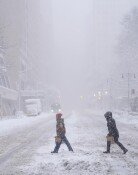Netizens Give Cold Shoulder to Internet Presidential Election Events
Netizens Give Cold Shoulder to Internet Presidential Election Events
Posted November. 15, 2007 03:58,
It was assumed that the Internet would play an important role in the 17th presidential election. Internet portal sites put more effort than ever into the upcoming election by featuring special sections for the election for the first time. But netizens are not enthusiastic about them.
Presenting itself as the official homepage for the presidential election since October, Naver has provided the bandwidth for its Your Choice! The 2007 Presidential Election website (epol.naver.com). One month after the site went live, however, there are just around 100 posts in the debate forum, and each post has been read by less than 1,000 people so far. Given every post on Naver enjoys thousands of replies on average, the results have fallen far short of expectations.
Daum has also tried to get netizens attention by launching websites such as the UCC (User Created Content) Competition site and a Election pledges useful in everyday lives site on its feature section page at election2007.media.daum.net. But only 70 user created content pieces have been submitted for the competition, even though the winner is awarded actual prize money.
Yahoo set up a special site for the election (kr.2007korea.yahoo.com) in March and conducted its own poll to survey the approval ratings of each candidate. But the trustworthiness of the poll was challenged due to surveyed scale and sampling issue.
All this shows that netizens have given the cold shoulder to online websites sponsored by big domestic portal firms regarding the upcoming election. According to Rankey.com, a website rater, weekly visitors to Navers presidential election page numbered some 130,000 in the first week of November. That figure is less than a 100th of Navers weekly average visitorship of 22 million. Daum is not doing much better. It attracted only 88,408 people a week to its presidential election site, 0.5 % of its average 18 million visitors.
Experts attribute this to a lack of communication and political indifference. Article 93 of the election law, which restricts peoples free expression, is the problem. The key to the election is allowing people to freely express their opinion about whether they support one candidate or disapprove of another. But the law bans this kind of free expression, undermining political presentations on the Internet, said Song Gyeong-jae, a political science professor at Kyunghee University. He pointed out that the election law that was revised in 2004 suppresses free expression on the Internet.
Some place the blame on local portal sites. Lee Jun-hee at the Media Association for the Presidential Election said, Ahead of the election, Naver set up a political debate page and allowed netizens to post their options on political news there. The move is to prevent the diffusion of public opinion. Naver said it wanted to avoid a possible violation of the election law, but it ignored the role of portals in providing a place for the public to vent their opinions freely.
Real politics are not free from responsibilities either. Overall, public interest in the presidential election decreased compared to 2002. A traffic comparison between the 16th presidential election candidate homepages and those of the 17th hints at how indifferent people have become, said web analyst Mun Ji-eun.
In fact, Nosamo (www.nosamo.org), the fan club site for then presidential candidate Roh Moo-hyun lured 32,723 daily visitors. However, this year, Myeongbaksarang (www.mblove.org) for GNP candidate Lee Myeong-bak only attracted 9,935 visitors, Changsarang (www.changsarang.com) for Lee Hoe-chang 11,604, and Huimangmoon (www.dreammoon.kr) for Mun Guk-hyeon 6,587.
fineday@donga.com hyejin@donga.com






![[송평인 칼럼]‘빙그레 엄벌’ 판사와 ‘울먹이는 앵그리버드’ 판사](https://dimg.donga.com/c/138/175/90/1/wps/NEWS/IMAGE/2026/02/25/133425247.1.jpg)
